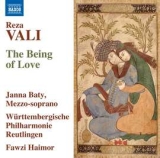Reza Vali ist ein in den USA lebender Komponist, der in Iran geboren wurde. Dort erlebte er am Konservatorium in Teheran eine Phase, in der westliche Musik unterrichtet wurde und die musikalische Tradition des Iran abgetan wurde. Das ging soweit, dass Interessierte an dieser Tradition bestraft wurden. Er musste sich also insoweit seinen eigenen Zugang verschaffen. Trotzdem begann er, aus einer Leidenschaft heraus, Volkslieder zu sammeln. Nach dem Studium in Wien, zog er in die Vereinigten Staaten.
Die Werke dieser Aufnahme haben sich aus den musikalischen Offenbarungen, die Reza Vali hatte und die seinen aktuellen kompositorischen Ansatz begründeten, ergeben. Er entwickelte ein neues System, das obwohl es bis zu 35 verschiedene Tonhöhen pro Oktave haben kann, für Musiker relativ leicht zu erlernen ist. Diese sind Grundlage für den größten Teil seiner Musik, die auch westliche musikalische Formen meidet und stattdessen solche erforscht, die aus dem iranischen Datstgâh-Maqâm-Modalsystem stammen. Dazu gehören Ruf- und Antworttypen der Polyphonie sowie verschiedene Arten der Ausarbeitung musikalischer Phrasen anstatt motivischer Entwicklung. Das Dastgah-Maqam-System verwendet eine 17-tönige ungleiche Skala, die einen Zyklus rein gestimmter vollkommener Quinten mit mehreren kleineren Intervallen kombiniert, die ebenfalls auf reinen Verhältnissen beruhen.
Nach diesem Dastgah-Maqam-Systems sind Ravân, ein schillernder Konzertauftakt und das mikrotonale Isfahan, das aus einer bis heute fortlaufenden Serie von « Kalligraphie »-Kompositionen stammt, die auf den Formen, Rhythmen und Modi der des klassischen iranischen Musik basieren.
The Being of Love (Folk Songs, Set No. 16) ist ein äußerst bewegender Zyklus von fünf Liedern, die volkstümliche Texte und ein Gedicht von Rūmī, einem persischen Dichter und Mystiker sowie Originaltexte von Vali selbst musikalisch verwenden. Laut Vali beschwören die fünf Söhne verschiedene Aspekte der Liebe. Das Beiheft gibt auch dazu weitere Details.
Die Württembergische Philharmonie Reutlingen hat sich dieser eigenwilligen Sprache mit Hingabe geöffnet. Drei Jahre lang war der Dirigent Fawzi Haimor Musikdirektor des Orchesters, so dass aus dieser Historie die enge Verbindung miteinander besteht. Zusammen erkunden sie diese Musik in ebenso eindringlichen wie die Freude am Leben anbietenden Interpretationen. Dabei zeigen sich die Musiker den ungewohnten Tonhöhen gewachsen und es gelingt ihnen auch, die Ausdruckswerte der Musik souverän darzustellen.
Die Mezzosopranistin Janna Baty ist auf moderne Musik spezialisiert und findet sich deshalb ohne Anlaufschwierigkeiten in The Being of Love ein, immerhin ist ihr Beitrag vom ersten Ton an gefragt. Baty’s Stimme belebt mit ihrem düsteren, geradezu erdigen Timbre diese Liebeslieder. Ihre stimmliche und interpretatorisch beeindruckende Präsenz zeichnet sie weiterhin aus.
Reza Vali is a composer living in the USA who was born in Iran. There, at the conservatory in Tehran, he experienced a phase in which Western music was taught and the musical tradition of Iran was dismissed. This went so far that those interested in this tradition were punished. He therefore had to create his own access to it. Nevertheless, he began to collect folk songs out of a passion. After studying in Vienna, he moved to the United States.
The works on this recording have emerged from the musical revelations that Reza Vali had and which established his current compositional approach. He developed a new system which, although it can have up to 35 different pitches per octave, is relatively easy for musicians to learn. These form the basis for most of his music, which also eschews Western musical forms and instead explores those derived from the Iranian Datstgâh-Maqâm modal system. These include call and response types of polyphony as well as different ways of elaborating musical phrases rather than motivic development. The Dastgah Maqam system uses a 17-note unequal scale that combines a cycle of purely tuned perfect fifths with several smaller intervals that are also based on pure ratios.
Following this dastgah maqam system are Ravân, a dazzling concert opener, and the microtonal Isfahan, which comes from an ongoing series of « calligraphy » compositions based on the forms, rhythms and modes of Iranian classical music.
The Being of Love (Folk Songs, Set No. 16) is an extremely moving cycle of five songs that make musical use of folk texts and a poem by Rūmī, a Persian poet and mystic, as well as original texts by Vali himself. According to Vali, the five sons evoke different aspects of love. The booklet also provides further details.
The Württembergische Philharmonie Reutlingen has embraced this idiosyncratic language with dedication. Conductor Fawzi Haimor was the orchestra’s music director for three years, so this history has resulted in a close connection. Together they explore this music in interpretations that are as haunting as they are joyful. The musicians prove themselves equal to the unfamiliar pitches and also succeed in confidently presenting the expressive values of the music.
Mezzo-soprano Janna Baty specializes in modern music and therefore finds her way into The Being of Love without any troubles; her contribution is in demand from the very first note. Baty’s voice enlivens these love songs with its dark, almost earthy timbre. Her impressive vocal and interpretative presence continues to set her apart.
























